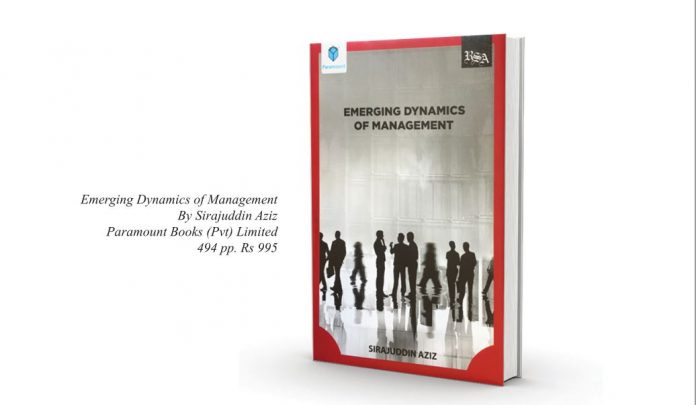
Presently the President and CEO of Habib Metropolitan Bank, with extensive experience of working in China, Hong Kong, Nigeria, the UAE and the UK, and, of course, Pakistan, Sirajuddin Aziz is a banker’s banker.
If anything reflects that amply it is the author’s acknowledgements by the score spread over three pages that reads like the Who’s Who of banking and government in our neck of the woods, the Middle East and elsewhere.
Yet, quite conspicuous by its absence is, the in-your-face hauteur of the successful in the corporate world that emanates from ‘I’ve been there, done that’.
“Without leaving the apron-strings of idealism, I am a practical person,” writes the author in his acknowledgements note, further dilating, “This book is about ‘experience’ and so there are numerous persons who have helped me in understanding human behaviour and its impact on management.”
At the fag-end of 2017, Paramount Books published Aziz’s 494-page compendium – a compilation of his columns contributed to one of the frontline contemporary national English dailies over half a dozen years but in its essence traversing “four decades of professional journey” – under the title, ‘Emerging Dynamics of Management’.
Browsing through the book – just to size it up for reading from delving into it or to put it aside in favour of something better – two things struck one immediately: the writer’s having garnered experiences and insights worth sharing, and also that he has skills to communicate them in a manner highly lucid and readable – at places with exceptional eloquence. The manner in which some of the literary, business and banking luminaries and statesmen are weaved into various pieces through quotes and narration points to the author having imbibed deep on the well of literature out of love for finer things in life and not out of occupational requirement.
Apart from the plethora of practical wisdom packed in tightly written pieces [See excerpts from several sections] that sets one thinking, as also the tone and tenor and quality of language, the topicality of issues under discussion are most apt and illuminating.

Management insights:
Divided in seven sections and containing 122 columns, to remain abreast of ever-evolving business and management techniques, the book is a must-read not just for the aspiring and even established bankers but also the middle and upper tier managers in the vast corporate world for its variety of topics. For who would not want to draw from this volume insight into traditional and contemporary topics, with each dilated upon from various angles in several columns, such as: ‘Communication’, ‘Strategy and Organisational Structure’, ‘Leadership’, ‘Personal Development’, ‘Human Resource Management’, ‘Board Rooms and Committees’, and ‘Manager’s Tool Box.’
Dr Ishrat Hussain, a leading economist and a former governor of the State Bank of Pakistan, in his appraisal writes that the book does not come to him as a surprise. “He is one of the few banking professionals who has always devoted time to reading, reflecting and writing, and using those insights and knowledge for articulating and disseminating fresh ways of thinking and doing things. Dr Hussain, calling it a ‘must read’ for business schools, also recommends it “to those going through mid-career and executive education training.”
Amir Zia, a leading media person, holds says on the book’s flap: “In Pakistan’s corporate world there are scores of champion leaders and gurus, but hardly few of them share and transfer their experiences, management insights and career lessons in writing, let alone in the form of a book.”


































